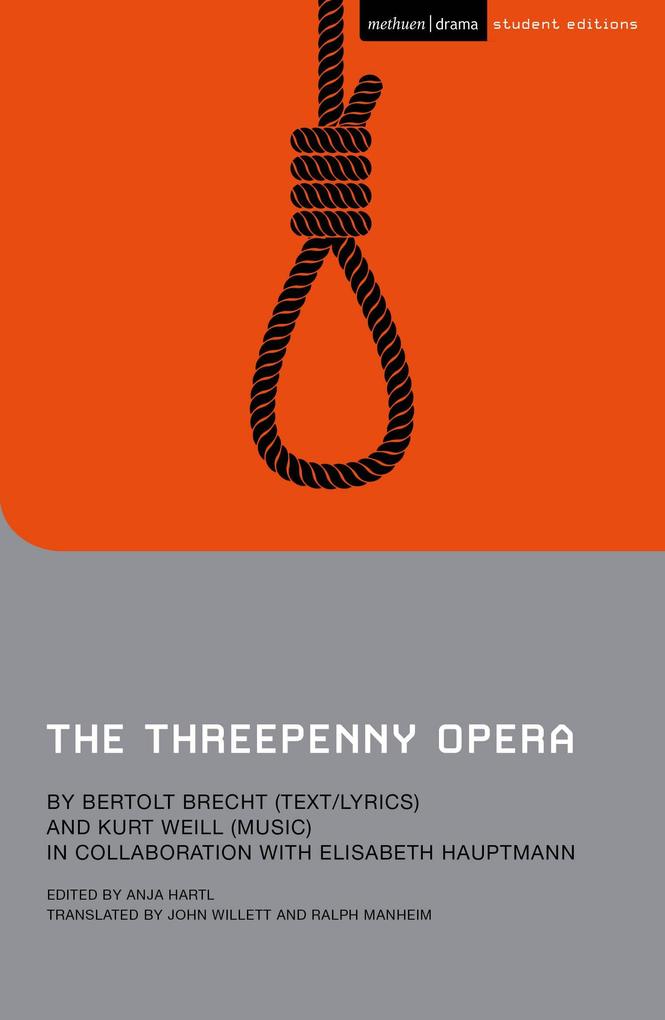Bücher versandkostenfrei*100 Tage RückgaberechtAbholung in der Wunschfiliale

Zustellung: Mo, 14.10. - Fr, 18.10.
Versand in 3 Wochen
VersandkostenfreiBestellen & in Filiale abholen:
One of Bertolt Brecht's best-loved and most performed plays, The Threepenny Opera was first staged in 1928 at the Theater am Schiffbauerdamm, Berlin (now the home of the Berliner Ensemble).
Based on the eighteenth-century The Beggar's Opera by John Gay, the play is a satire on the bourgeois society of the Weimar Republic, but set in a mock-Victorian Soho.
With Kurt Weill's music, which was one of the earliest and most successful attempts to introduce the jazz idiom into the theatre, it became a popular hit throughout the western world.
This new edition is published here in John Willett and Ralph Manhein's classic translation with commentary and notes by Anja Hartl.
Based on the eighteenth-century The Beggar's Opera by John Gay, the play is a satire on the bourgeois society of the Weimar Republic, but set in a mock-Victorian Soho.
With Kurt Weill's music, which was one of the earliest and most successful attempts to introduce the jazz idiom into the theatre, it became a popular hit throughout the western world.
This new edition is published here in John Willett and Ralph Manhein's classic translation with commentary and notes by Anja Hartl.
Inhaltsverzeichnis
Chronology
Contexts
- Historical, social and cultural
- Political and social climate of the 1920s
- Cultural context: the Roaring '20s
- Significance of the play for Brecht and for political theatre
- 18th century context
- 20th century context
- Britain vs. Germany; London/East London
Genres
- Opera/music/theatre - a new theatrical genre
- Adaptation - John Gay, The Beggar's Opera
- Hybridity: low- and highbrow, emphasis on fun, entertainment in Brechtian theatre
- Satire
Themes
- Who is who? Bourgeois and/or beggar?
- Role of the institutions (police, royal family, state)
- Corruption, money
- Exploitation, human trade, poverty
- Morality, asocial vs. social
- Love and sexuality, prostitution
- Resistance and change
- Which opportunities for change are envisioned by the play?
Characters
Male characters
- Peachum empire
- Macheath
- Tigerbrown
Female characters and sexual politics of the play
- Mrs Peachum
- Polly
- Jenny
Play as performance
- Brechtian principles of theatre-making
> emphasis on dialectical theatre
> theatricality
> actor-audience relationship
> deus-ex-machina ending
- Music
> Kurt Weill's composition
> Brechtian opera
> The significance of the songs
Academic debate
- Central strands in scholarship (comparative readings, focus on music and operatic genre)
Production history
- German productions (Berliner Ensemble; new production announced for January 2021)
- English productions
- International success (and problems which ensued: misinterpretation, commercialisation, etc.)
- Der Dreigroschenprozess (The Threepenny Trial by Bertolt Brecht)
- Simon Stephens's recent new version at the National Theatre, UK
- Joachim Lang's film Mackie Messer - Brechts Dreigroschenfilm
Behind the scenes
Interview with playwright Simon Stephens
Further reading and viewing
THE THREEPENNY OPERA
Additional texts
Notes
Contexts
- Historical, social and cultural
- Political and social climate of the 1920s
- Cultural context: the Roaring '20s
- Significance of the play for Brecht and for political theatre
- 18th century context
- 20th century context
- Britain vs. Germany; London/East London
Genres
- Opera/music/theatre - a new theatrical genre
- Adaptation - John Gay, The Beggar's Opera
- Hybridity: low- and highbrow, emphasis on fun, entertainment in Brechtian theatre
- Satire
Themes
- Who is who? Bourgeois and/or beggar?
- Role of the institutions (police, royal family, state)
- Corruption, money
- Exploitation, human trade, poverty
- Morality, asocial vs. social
- Love and sexuality, prostitution
- Resistance and change
- Which opportunities for change are envisioned by the play?
Characters
Male characters
- Peachum empire
- Macheath
- Tigerbrown
Female characters and sexual politics of the play
- Mrs Peachum
- Polly
- Jenny
Play as performance
- Brechtian principles of theatre-making
> emphasis on dialectical theatre
> theatricality
> actor-audience relationship
> deus-ex-machina ending
- Music
> Kurt Weill's composition
> Brechtian opera
> The significance of the songs
Academic debate
- Central strands in scholarship (comparative readings, focus on music and operatic genre)
Production history
- German productions (Berliner Ensemble; new production announced for January 2021)
- English productions
- International success (and problems which ensued: misinterpretation, commercialisation, etc.)
- Der Dreigroschenprozess (The Threepenny Trial by Bertolt Brecht)
- Simon Stephens's recent new version at the National Theatre, UK
- Joachim Lang's film Mackie Messer - Brechts Dreigroschenfilm
Behind the scenes
Interview with playwright Simon Stephens
Further reading and viewing
THE THREEPENNY OPERA
Additional texts
Notes
Produktdetails
Erscheinungsdatum
10. März 2022
Sprache
englisch
Seitenanzahl
152
Autor/Autorin
Bertolt Brecht, Kurt Weill
Herausgegeben von
Anja Hartl, Chris Megson, Jenny Stevens, Matthew Nichols, Sara Freeman
Übersetzung
John Willett, Ralph Manheim
Verlag/Hersteller
Produktart
kartoniert
Gewicht
127 g
Größe (L/B/H)
199/128/10 mm
ISBN
9781350205284
Bewertungen
0 Bewertungen
Es wurden noch keine Bewertungen abgegeben. Schreiben Sie die erste Bewertung zu "The Threepenny Opera" und helfen Sie damit anderen bei der Kaufentscheidung.









